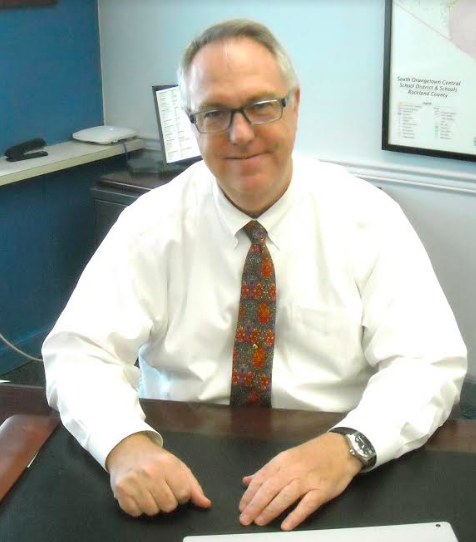
By Barry Warner
A new school year is an opportunity for a fresh start, and September sets the tone for primary goals to be accomplished. Superintendent of Schools, Dr. Robert Pritchard, knows that the most important job of the school district is to make sure students are learning and achieving at high levels.
“In the Learner Active Technology Infused Classroom (LATIC), students engage in real-world problems that provide an opportunity to build skills and concepts by learning independently and collaboratively with their classmates,” he told the Rockland County Times. “Every year, more teachers are put through LATIC instruction in the summer so they can include project learning in their English, social studies, math and science lesson plans.”
“During the opening day ceremony, Dr. Nancy Sulla spoke about developing learning environments to support learner-active, technology-infused classrooms that promote problem-based learning,” Dr. Pritchard continued. “In ‘executive functioning,’ students take charge and act as leaders of their own learning. Our facilities have not kept up with the new learning. New kinesthetic classroom furniture called flexible-seating has been ordered. Instead of the traditional classroom with rows of desks, teachers are experimenting with a variety of seating arrangements such as wobble chairs, standing desks or partitions. I have always said that I would like the high school to look more like a kindergarten because it is structured for kids to move around to explore and pursue their interests.”
“Capital expenditures next year involve replacing the artificial turf at the high school with coconut husk, building a media center at Cottage Lane E.S., plus a dedicated space at the high school for the FIRST robotics competition,” Dr. Pritchard says. “In addition, we are expanding our co-curricular interscholastic sports and music programming. Eighth-graders in South Orangetown Middle School technology classes have been experimenting with a computer numerical controlled laser engraver and cutter (CNC). Students used the laser to engrave designs they created using AutoCad (commercial computer-aided design and drafting software) and Adobe Photoshop key chains made from salvaged wood and on their anodized aluminum cell phone cases. This is an open-ended approach to engineering. Programming is being taught at the elementary level starting in kindergarten. Teachers are being hired with a technology education background plus credits in computer programming. This area of technology education is being used in all four buildings in the district.
“Additional courses emphasizing 21st century skills will include horticulture and a greenhouse plus sustainable agriculture,” Dr. Pritchard says. “In aquaponics, students will set up an ecosystem with a fish tank and tilapia. The wastewater from the tilapia that contains higher amounts of nitrogen gets pumped into growing corn. Students in technology courses in grades 7 and 8 are designing tiny houses with renewable energy that are prep for high school studies. We are looking for space at the high school where laboratory and technology teachers can integrate the curriculum with project-based instruction. We consider ourselves a 21st century learning institution where students physically touch their work. In the sixth grade Challenge Lab, students conduct college-level research in an area of their own interest using makerspace. We develop the ‘whole’ child through art, music, athletics and a broad array of courses. The South Orangetown Central School District welcomed Orangetown Police Officer Andrew Vergine as its dedicated full-time School Resource Officer on September 4.”
A makerspace is a collaborative workspace inside a school or library for making, learning, exploring and sharing that uses high-tech to no tech tools. These spaces have a variety of maker equipment including 3D printers, laser cutters, CNC machines, soldering irons and sewing machines. The core of the maker mindset is creating something out of nothing and exploring one’s own interests. These spaces are also helping to prepare those who need the critical 21st century skills in the fields of science, technology, engineering and math (STEM). They provide hands-on learning, help with critical thinking skills and even boost self-confidence. Some of the skills that are learned in a makerspace pertain to electronics, 3D printing, 3D modeling, coding, robotics and woodworking.
New electives at Tappan Zee High School include Alternative Fuels, Spanish for Heritage Speakers and Linear Algebra:
- Alternative Fuels: This course covers the fundamentals of thermodynamics, chemistry, flow and transport processes as applied to energy systems. Topics include analysis of energy conversion in thermomechanical, thermochemical, electrochemical and photoelectric processes in existing and future power and transportation systems, with emphasis on efficiency, environmental impact and performance.
- Spanish for Heritage Speakers: Using the language base students already possess, this course is designed to help students expand their Spanish vocabulary, advance their reading and writing skills and improve their grammar.
- Linear algebra: A challenging college-level course, Linear Algebra introduces students to a variety of topics, such as matrix operations, systems of linear equations, determinants and linear transformations. An emphasis will be placed on exploring the practical aspects and uses of Linear Algebra in relation to the real world and careers.
The unit on order for Tappan Zee High School is a Tomach Series 3 CNC Mill, which is an actual Computer Numerical Control milling machine. This is a precision machine with the power to cut a vast range of materials including stainless, titanium and pre-hardened tool steel. Students will be exposed to and learn the various processes involved in designing and prototyping to the actual production of new products.
Tappan Zee High School’s rookie FIRST Robotics Competition Team 6911, South Orangetown BOTZ, won the Rookie All-Star Award at the FIRST Championship in Detroit in April 2018. The team advanced to the international competition after earning the Rookie Inspiration Award at the Hudson Valley Regional FRC Tournament at Rockland Community College in March and the Rookie All-Star Award at the SBPLI Long island #1 Tournament at Hofstra University early in April 2018. Of the 7,000 FIRST Robotics Competition teams globally, 405 advanced to FIRST Championship in Detroit April 25-28, 2018.

You must be logged in to post a comment Login